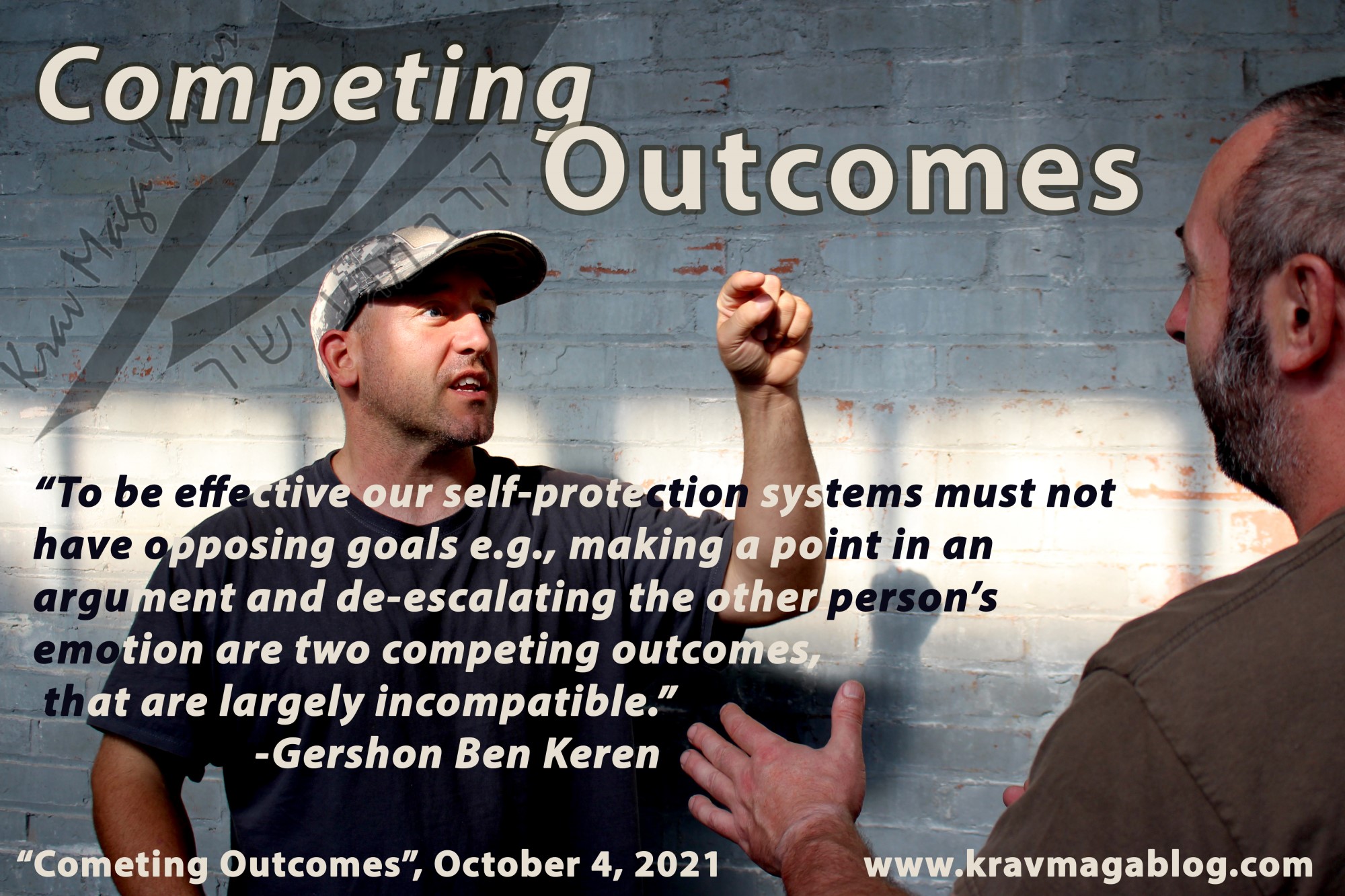Author: Gershon Ben Keren

There are many reasons why systems fail, whether they be physical systems (such as engineering systems) or security ones. Often, when it is security systems, failure occurs due to multiple goal conflicts e.g., an individual wants to avoid a physical confrontation, but at the same time get the other person(s) they are in conflict with to admit that they were wrong, and make an apology to them etc. Unfortunately, in the moment, many people, don’t recognize that these goals are in opposition to each other, and so continue to pursue a strategy, and use a “system” that is unable to accomplish both. This often occurs because outcomes are looked at in isolation, rather than within the dynamic and complex interaction, that is an aggressive dispute. The connections/disconnections between the different potential outcomes are not considered. One of the other reasons that systems often fail is that a system that works in one environment/context doesn’t in another e.g., de-escalation and conflict resolution methods that can be applied in a workplace setting, where all parties agree to buy in to the process, and adhere to the social structure of the organization, cannot be directly applied to a dispute in a bar/pub between two strangers. In this article I want to look at how people often drift towards failure without recognizing they are doing so, and how once they have, there are often few paths back.
In 1995 Barings Bank collapsed, after Nick Leeson, gambled the bank’s money on futures contracts. The reason he could do this unnoticed and unchecked was due to Baring’s effectively giving Leeson two roles that were meant to keep such activities in check. Without having to report his losses to anyone else, there was a complete lack of oversight concerning his activities. This is something that is common with many white-collar crimes; the organization creates an opportunity that an employee can exploit. What normally happens is when such an opportunity is recognized the employee makes a “small” test to see if they will be apprehended and when they aren’t, they increase the extent of what they are doing, usually only getting caught when they get lazy and make a mistake or do something so big that it’s impossible for it to go unnoticed. In many ways by hiding his first loss, Leeson set himself up to fail spectacularly, as the only way he could make up a loss was to make ever bigger bets on the market, in an attempt to try and cover up each successive loss. There could have been a point where Baring’s could have survived, if Leeson had come clean, and stopped making bets and covering up his losses, but his system only had one way it could work, and that was to make a big win. Unfortunately for him the route to get there was fundamentally flawed. During my time working bar/club security, I saw so many people get so invested in a trivial dispute that they were unable to walk away, with each word spoken being a gamble that they hoped would “pay off” e.g., get the other person to back down, and admit they were wrong. Both parties drifting towards failure.
Predictable but misunderstood outcomes also create ineffective systems. I’m always amazed when people on hearing a disturbance or loud argument, either go to have a look or send somebody to have a look for them etc. Turning up at an argument/confrontation rarely goes well, especially if it is some form of domestic/relationship dispute. Even “qualified” people who have experience dealing with such volatile situations understand that there are no easy or straightforward solutions to these types of incidents, and yet many unqualified people believe they have the necessary negotiation skills to de-escalate such confrontations. Walking towards what could be a volatile and violent conflict is never a good idea, and if you believe someone is actually in danger, rather than just being somewhat curious about what is going on, making a 911 call, to pass this over to law-enforcement would be a better idea. I am reminded of an incident a few years back where a homeowner was woken from their sleep by someone breaking into their car on their driveway. Their initial response was to shout out of the bedroom window, but this didn’t deter whoever it was from continuing to break in. This should have been the warning sign, as in most cases criminals engaged in property crimes will flee the scene when spotted, so someone who doesn’t leave probably when disturbed, probably has other motives/motivations at play. When the car’s owner went out to confront him, he was attacked with a machete and suffered serious injuries. This obviously wasn’t the script that he thought the incident would follow. Determining the outcome before questioning the steps that will get you there often results in failure and should be avoided.
To be effective our self-protection systems must not have opposing goals e.g., making a point in an argument and de-escalating the other person’s emotion are two competing outcomes, that are largely incompatible. We must also understand how a certain step, such as confronting a car thief, might end in a critical failure, because we didn’t take feedback from a previous step, in not questioning why someone trying to break into our car continues to do so after they’ve been discovered. Often, we don’t recognize the flaws and blind spots in our systems as we rarely get to test them, and so they remain unchallenged. One way to remedy this is to do scenario-based training, and another – if you don’t have other individuals to interact with - is to “war game” it, looking at the many different directions a confrontation or threat could head in.